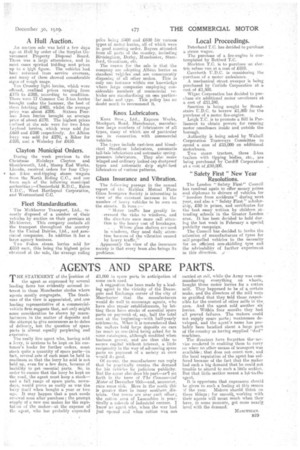AGENTS . AND SPARE PARTS.
Page 7

If you've noticed an error in this article please click here to report it so we can fix it.
THE STATEMENT of the 'Position of the agent as expressed by several leading firms has evidently aroused interest in those Manchester circles where agents mostly congregate. The frankness of the view is appreciated, and-one leading representative of a commercialvehicle firm suggests that, not only might some consideration be shown by manufacturers in the matter of deposits and the attempt to give assurances as to dates of delivery, but the question of spare parts is almost equally perplexing and expensive.
The really live agent, who, having sold a lorry, it anxious to be kept on his customer's books for further orders, must stock quite aquantity of spare parts—in fact, several sets of eaoh must be held in readiness so that the lorry he sold is not held up, even for a few days, because of inability to get essential parts. SO, in order to ensure that the lorry be kept on the road, the agent must keep a stock— and a full range of spare parts. nowadays, would prove as costly as was the lorry itself when bought a year or two ago. It may happen that a loart needs renewal soon after purchase; the prompt supply of a new one makes for the reputation of the maker—at the expense of the agent, who has probably expended
£1,000 ins sp-are parts in anticipation of sonic web need.
A suggestion, has been made by a leading agent in the vicinity of the Deansgate and Exchange corner of the city of Manchester that the ma-nufacturers would do well to encourage agents, who have also repair .establishthents, by letting them ha,vo stocks of essential spare parts on payment of, say, half the total cost at the beginning—with -half-vearly settlements. When it is remembered that the makers hold :large deposits on ears (as. much as one-third being asked for in some catalogues, although Modified when business grows), and are thus able to secure capital without interest, a little reciprocity in the way Ofadvancing spare parts on payment of a moiety at Gime would do good. Of course, the manufacturer can reply that he practically creates the demand for his vehicles by judicious publicity. But the agent also does his part—eel se-1 krill in she twee of TheCommercial Motor of December 16th—and, moreover, reins sonic risk. Here in the north thii is greater than in many southern districts. Our towns are near ea-ch other the cotton area of Lancashire is practically a cobweb of industrial centres. know an agent who, when the -war had inst opened and when cotton was net carried on rail, while the Army was commandeering everything on wheels, bought three motor lorries for a cotton mill. They happened to be of a, certain make, and the directors Of the mill were so gratified that. they told those responsible for the control of other mills in the. area. And the agent sold another six lorries. Within four months they had all proved failures. The makers could not supply spare parts ; weaknesses de; veloped, and the agent's name has probably been bandied about a large part of the country as having supplied "dud" machines.
The directors have forgotten the-service rendered in enabling them to carry on when no other means of transport was available; that does not count. now, and the local reputation of the agent -has suffered because of the fact that the maker had such a big demand that he could not trouble to attend to such a little section. But that little section meant a lot-tosthe agent. " It is opportune that expression should be given to such a feeling at this season af the year. Makers should think on these things: for smooth, working with their agents will mean much when they have, in some measure, got more nearly level with the demand.


























